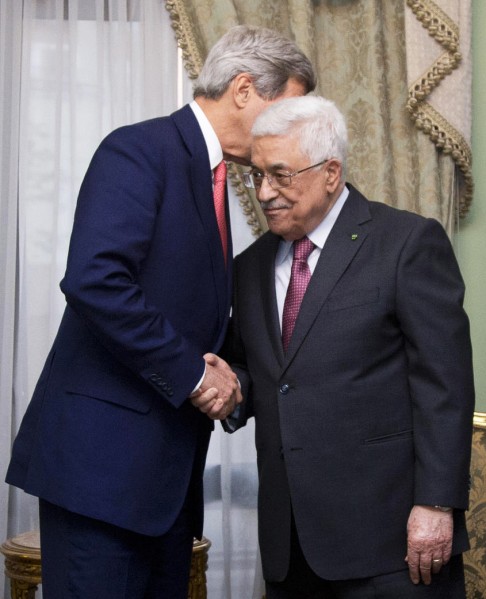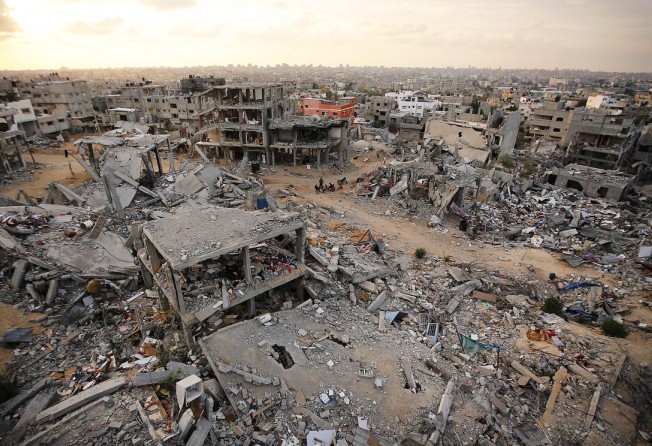
Donors pledge more than US$5 billion to rebuild Gaza but warn it is the last time they will pay
Appeal for money to rebuild shattered territory attracts more than US$5 billion but patience is wearing thin after repeated conflicts ruin Gaza

As nations and organisations pledged more than US$5 billion to rebuild the war-ravaged Gaza Strip, several major donors said that this was the last time they would pay and urged Israel and the Palestinians to negotiate a final peace settlement leading to two separate states.
Appearing in Cairo at a conference of more than 50 donor nations, US Secretary of State John Kerry on Sunday announced that the United States would contribute an additional US$212 million to Palestinians, including Gazans. "The people of Gaza do need our help, desperately - not tomorrow, not next week, but they need it now," he said.
The United States had committed more than US$400 million to aid Palestinians, Kerry said.
The Palestinian Authority says that US$4 billion will be needed over the next three years to rebuild Gaza, which was devastated by Israeli artillery and missiles during the recent 50-day conflict. Some of that weaponry was provided by the United States, which gives Israel US$3 billion a year in aid, most of it in the form of military assistance.
On Sunday, Qatar committed US$1 billion towards the reconstruction of Gaza. The United Arab Emirates, Kuwait and Turkey pledged US$200 million each. All told, the donors pledged US$5.4 billion, Norwegian Foreign Minister Borge Brende announced on Sunday night. The figure surpassed gloomy forecasts that some fatigued donors would keep their coffers closed to yet another appeal for Gaza.
Brende said US$400,000 would be used for immediate, humanitarian aid and the rest set aside for reconstruction.
He made it clear, however, that Europe's patience is wearing thin.
"It's understandable for donors and taxpayers alike to ask why taxpayers should pick up the bill for what warring parties have torn down," he said. Israel pounded Gaza by land, sea and air over the summer as it targeted Hamas, the Islamist militant group that controls the enclave. It was the third war in less than six years between the two sides.
According to the Palestinians, 2,145 people were killed in Gaza during the hostilities, including more than 500 children. The United Nations estimates that almost 70 per cent of the dead were civilians. Israeli Prime Minister Benjamin Netanyahu has said that 1,000 of those killed were "terrorists".
The Palestinians say that 18,000 houses were destroyed in the bombing, rendering 100,000 people homeless. Gaza's population is 1.7 million. The United Nations reported that 40,000 people without homes were still being sheltered in 19 UN schools in Gaza.
The damage to Gaza includes telecommunications grids, schools, sanitation lines, mosques, hospitals and major factories.

Kerry repeatedly said that Israelis and Palestinians must chart a different course for the future or there would be another war, and another such conference, in a year or two.
"Now is the time to break this cycle once and for all," he said.
"Israel is right to be deeply concerned about rockets, tunnels and security," he added, referring to a network of tunnels used by Palestinian militants to enter Israeli territory. "And the Palestinians have the right to be concerned about their day-to-day life, and their future aspirations to have a state."
Israel drew pointed criticism from several speakers at the conference, who denounced its partial blockade of Gaza and its military occupation of the West Bank.
Ban Ki-moon, secretary general of the United Nations, called Gaza "a tinderbox".
"We must not lose sight of the root causes of the recent hostilities: a restrictive occupation that has lasted almost half a century, the continued denial of Palestinian rights and the lack of tangible progress in peace negotiations," he said.
Ban made only a fleeting reference to what Israel considers the fundamental cause of the recent war - rocket fire from Gaza.